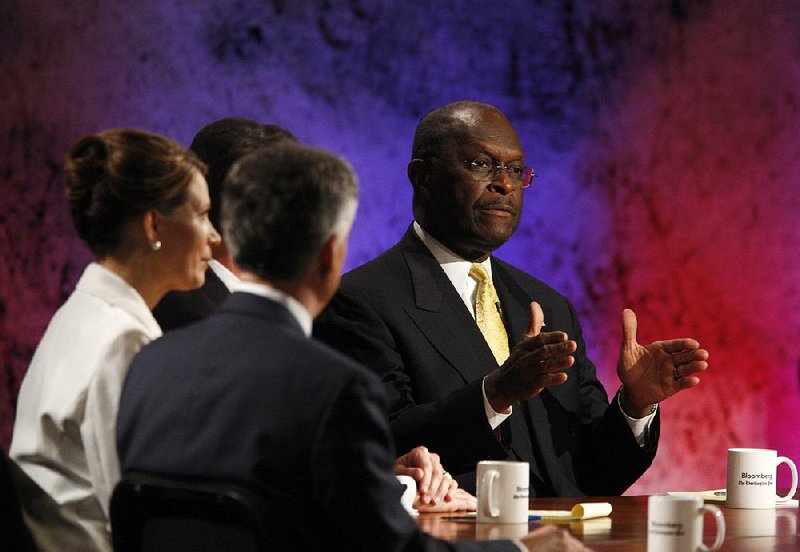WASHINGTON -- Opposition of at least four Senate Republicans has all but doomed the chance of Herman Cain to win a seat on the Federal Reserve's board of governors, serving as one of the most striking rebukes to President Donald Trump's personnel choices since he took office in 2017.
Sens. Mitt Romney, R-Utah; Lisa Murkowski, R-Alaska; Cory Gardner, R-Colo.; and Sen. Kevin Cramer, R-N.D., all said they would oppose Cain if Trump nominated him to the Fed. Republicans control 53 seats of the 100-chamber Senate, and losing the support of four members means Cain would need help from Democrats, which appears unlikely.
"If I had to vote today, I would vote no," Cramer said Thursday.
Trump in recent days has said he wants to add Cain to the Fed's seven-member board of governors at a time when he has been repeatedly chiding the central bank's leadership for its management of interest rates. Trump also has said he wants to nominate conservative economist Stephen Moore to the Fed. Moore and Cain are both vocal Trump supporters and have called for slashing interest rates to make the economy grow even faster.
Independent analysts have called Cain far more partisan than typical Fed nominees.
Cain ran for president in the 2012 GOP primary, but lost momentum after several women came forward with accusations of sexual harassment or improper behavior. Cain has remained defiant about the accusations and said he looked forward to telling his side of the story during the confirmation process.
"I will be able to explain it this time, where they wouldn't let me explain it last time," he said last week in a Web video.
Senate Majority Leader Mitch McConnell, R-Ky., who has privately encouraged his members to take their concerns about problematic nominees directly to the White House, declined on Thursday to say whether Trump should refrain from nominating Cain altogether.
But he stressed that the White House needs to consider two factors in its nominations: the individual's background check, as well as that person's prospects of getting confirmed in the Senate.
"Several of our members have had strong feelings about people who've been mentioned in newspaper articles," McConnell told reporters. "I think that should be helpful to the administration, actually."
When asked whether he was surprised by Trump's consideration of Cain for the Fed, McConnell responded: "Surprised? On a daily basis."
During his first 18 months in office, Trump relied on Treasury Secretary Steve Mnuchin and other economic advisers to pick Fed nominees, but he has wrested control of the process in recent months after blaming Mnuchin for steering him toward Jerome Powell as Fed chairman. Powell was easily confirmed by the Senate, but Trump has told aides he regrets appointing Powell to the job because the Fed took several steps last year to raise interest rates and Trump has blamed this for slowing economic growth.
White House National Economic Council Director Larry Kudlow said Thursday morning that Trump was sticking by his decision to nominate Cain "at the moment."
He said Cain was still undergoing a background check by the FBI, and that the paperwork for his nomination had not yet been sent to the Senate.
Trump last week called Cain, former chief executive officer of Godfather's Pizza, "a truly outstanding individual," and he said, "I've told my folks that's the man."
Cain was not immediately available for comment. In remarks Wednesday night in Kansas, Cain called his Senate critics "a bunch of yahoos" and said he would not be deterred by criticism, according to the Kansas City Star.
Cain became popular during his run for president in 2011 by trumpeting a simplified version of the tax code that he called the "9-9-9" plan. His candidacy never took hold, though, and last year he started a super PAC aimed at helping Trump before the midterm elections.
House Speaker Nancy Pelosi, D-Calif., speaking to reporters at the Democratic Party's annual retreat in Virginia, slammed the potential nomination of Cain earlier on Thursday, calling him "totally unsuited, unqualified."
Cain also drew criticism from economists and Wall Street because of his past support for returning the U.S. to the gold standard. While Cain previously sat on the board of the Kansas City Fed, that position mostly advises Fed economists on research topics. Regional chairmen are not involved in setting monetary policy.
Cramer said he was still "pretty open and bullish on Stephen Moore." Cramer said Moore's personal issues -- involving unpaid alimony and taxes -- have been resolved, and that he didn't worry that the former Trump campaign adviser and author of Trumponomics, a book praising the president's economic policies, would lack the level of political independence normally expected from a Fed governor.
Moore also has drawn criticism from economists for tailoring his monetary views to suit his politics. He opposed a loose monetary policy when President Barack Obama was in office and endorsed that policy when Trump took over.
Information for this article was contributed by Damian Paletta, Mike DeBonis and Seung Min Kim of The Washington Post; by Jim Tankersley of The New York Times; and by Laura Litvan, Steven T. Dennis, Jennifer Shutt and Niels Lesniewski of Bloomberg News.
Business on 04/12/2019
